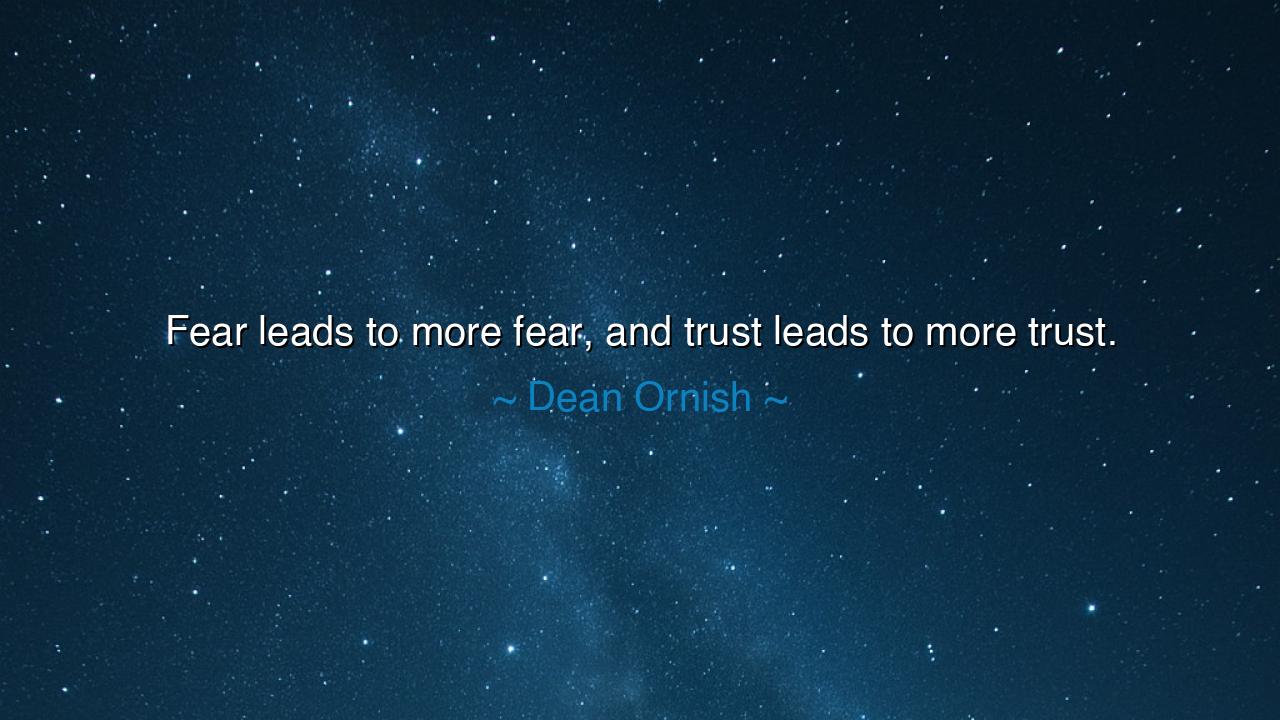
Fear leads to more fear, and trust leads to more trust.






Hear the gentle yet powerful wisdom of Dean Ornish, who proclaimed: “Fear leads to more fear, and trust leads to more trust.” In this brief teaching, he reveals a law of the human heart as binding as gravity upon the earth. What we choose to sow in our relationships multiplies. If we sow fear, suspicion grows, and walls rise higher between us. If we sow trust, understanding deepens, and bonds become stronger. Thus, our lives, our communities, even our nations, are shaped not merely by events, but by the spirit we choose to extend to one another.
The origin of these words lies in Ornish’s lifelong work as a physician, healer, and teacher. He saw not only the effects of food and exercise on health, but the deeper currents of fear and trust that shape human well-being. Fear constricts the heart, narrows the breath, and weakens the body; trust opens the heart, strengthens the spirit, and heals. What he observed in medicine reflects the larger truth of human life: that fear begets fear, while trust, once given, multiplies into a harmony that lifts all who share it.
History itself bears witness to this law. Consider the long Cold War between East and West. For decades, fear of the other fueled more fear: weapons stockpiled, suspicion thickened, and mistrust became a prison. Yet when leaders began to take small steps of trust—when treaties were signed, when walls were opened, when words of reconciliation replaced threats—the cycle shifted. What was once an age of terror began to transform into dialogue and cooperation. Fear had chained the world; trust began to unlock it.
But let us not imagine this law belongs only to kings and nations. It lives also in the small places—between friends, within families, in the heart of every relationship. When suspicion creeps into a marriage, each harsh word breeds more distance, each cold silence more isolation. Yet when trust is nurtured—through honesty, forgiveness, and consistency—love flourishes, and bonds endure through storms. Thus, the same truth Ornish spoke for nations applies also to the hearth: fear leads to more fear, and trust leads to more trust.
And what of the soul itself? Even within our own minds, this principle reigns. If we let fear govern us, we shrink from opportunities, we doubt our worth, and we retreat into smallness. But when we choose trust—trust in our abilities, trust in life’s unfolding, trust even in the divine—our courage grows. Step by step, trust becomes strength, and strength becomes peace. The heart that trusts becomes a wellspring of light to others, drawing them also into trust.
The lesson is luminous: choose carefully what you nurture. If you speak from fear, you will awaken fear in others. If you act from suspicion, suspicion will return to you. But if you begin with trust—offering it with patience, guarding it with truth—you will receive back the fruit of trust, multiplied. It is not naïveté to trust, but courage; for trust risks betrayal, yet without it, love and peace can never be born.
Therefore, O seekers of wisdom, remember Ornish’s teaching. Let fear not be your master, for it multiplies endlessly and devours the spirit. Instead, become a cultivator of trust. In your words, be honest; in your actions, be faithful; in your dealings, be kind. Sow trust, and trust will grow, spreading from your life into the lives of those around you. And in this way, step by step, you will break the chains of fear and build a world where peace and connection endure.
–––






BMNguyen Binh Minh
This quote made me reflect on how easily fear can spread. It’s like when one person starts panicking, it spreads to everyone around them. But if trust works the same way, could we have a similar ripple effect in a positive direction? How do we create environments that foster trust instead of fear? It seems like it would take a lot of collective effort to reverse the cycle of fear in society.
MNMy Ngocc
I’ve always believed that trust can help us build stronger relationships, but fear definitely complicates that. Fear of rejection, failure, or the unknown can often take control of our thoughts. How do we shift from a place of fear to a mindset of trust, especially when fear seems so much easier to fall into? What’s the first step in breaking that chain of fear and embracing trust in ourselves and others?
PCPham Chau
Dean Ornish’s quote seems to highlight a fundamental choice we face every day—do we choose fear, or do we choose trust? But how do we overcome the fears that hold us back, especially when we’ve been hurt or let down in the past? Trust feels like a leap of faith, but can we truly move from fear to trust, or is there a middle ground where we can feel safe yet open to others?
XLVan xuan Le
This quote makes me think about the power of mindset in our daily lives. Fear often holds us back, while trust opens up opportunities for growth and connection. But how do we cultivate trust in a world that often seems to be ruled by fear, especially with all the uncertainty around us? Is trust something that can be learned, or is it built over time through positive experiences?
TLHuyen tram le.H
I really like this idea that fear can become a self-perpetuating cycle, just like trust. It's so true that when we start fearing something, it seems like it just keeps growing, affecting more and more aspects of our lives. But what about trust? How do we build trust when so much of the world seems to be driven by fear? Is it really possible to break that cycle and shift towards trust?